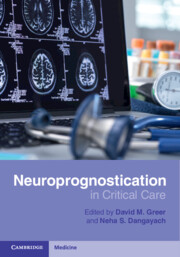Book contents
- Neuroprognostication in Critical Care
- Neuroprognostication in Critical Care
- Copyright page
- Epigraph
- Contents
- Contributors
- Chapter 1 Shared Decision Making
- Part I Disease-Specific Prognostication
- Part II Other Topics in Neuroprognostication
- Chapter 18 Prognostication in Palliative Care and Neurocritical Care
- Chapter 19 Prognostication in Chronic Critical Illness: Frailty, Geriatrics, Prior Severe Neurological Comorbidities
- Chapter 20 Prognostication in the Transition of Neurocritical Care: Neurorehabilitation and Placement, Role of Post-ICU Recovery Clinics, Insurance, Case Management
- Chapter 21 Religious and Legal Issues in Neuroprognostication
- Chapter 22 New Frontiers in Neuroprognostication: Machine Learning and AI
- Chapter 23 New Frontiers in Neuroprognostication: Biomarkers
- Chapter 24 New Frontiers in Neuroprognostication: Point-of-Care Ultrasonography
- Index
- References
Chapter 24 - New Frontiers in Neuroprognostication: Point-of-Care Ultrasonography
from Part II - Other Topics in Neuroprognostication
Published online by Cambridge University Press: 14 November 2024
- Neuroprognostication in Critical Care
- Neuroprognostication in Critical Care
- Copyright page
- Epigraph
- Contents
- Contributors
- Chapter 1 Shared Decision Making
- Part I Disease-Specific Prognostication
- Part II Other Topics in Neuroprognostication
- Chapter 18 Prognostication in Palliative Care and Neurocritical Care
- Chapter 19 Prognostication in Chronic Critical Illness: Frailty, Geriatrics, Prior Severe Neurological Comorbidities
- Chapter 20 Prognostication in the Transition of Neurocritical Care: Neurorehabilitation and Placement, Role of Post-ICU Recovery Clinics, Insurance, Case Management
- Chapter 21 Religious and Legal Issues in Neuroprognostication
- Chapter 22 New Frontiers in Neuroprognostication: Machine Learning and AI
- Chapter 23 New Frontiers in Neuroprognostication: Biomarkers
- Chapter 24 New Frontiers in Neuroprognostication: Point-of-Care Ultrasonography
- Index
- References
Summary
Clinical examination is central to prognostication in acute brain injury but it has its limitations, especially in presence of confounders like sedation, recent cardiac arrest or lack of access to full exam due to concomitant injuries.[1–3] Lack of robust clinical prognostication tools has allowed the possibility of scenarios where clinicians may withdraw care prematurely due to a presumed poor prognosis based on a poor neurological exam.[4] Conversely, clinicians may defer prognostication in a confounded neurological exam and maintain patients on advanced life support for days before the degree of neurological injury becomes manifest.[5] In some of these scenarios, cerebral hemodynamic evaluation using transcranial Doppler (TCD) may provide a noninvasive surrogate to assess cerebral perfusion and augment available information to aid in prognostication.
Introduced in 1982 as a noninvasive means of assessing cerebral blood flow by measuring velocities in intracranial vasculature, TCD has become a mainstay for evaluation of cerebrovascular hemodynamics in stroke and subarachnoid hemorrhage.[6]
- Type
- Chapter
- Information
- Neuroprognostication in Critical Care , pp. 328 - 339Publisher: Cambridge University PressPrint publication year: 2024

